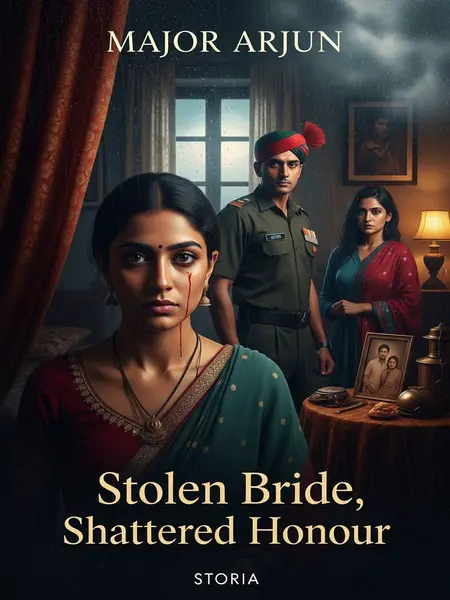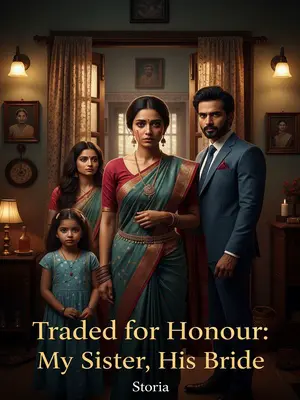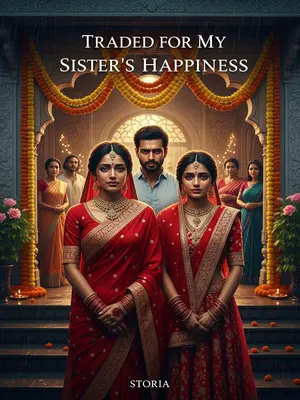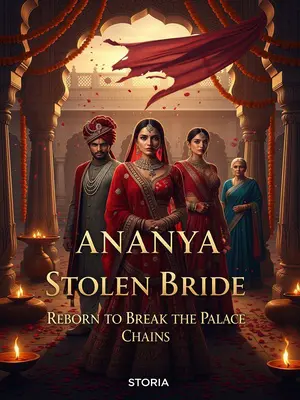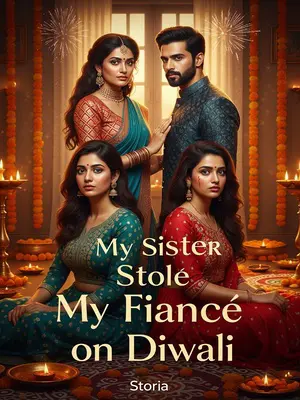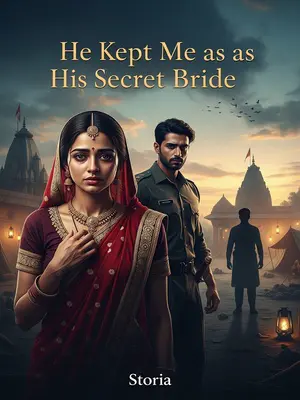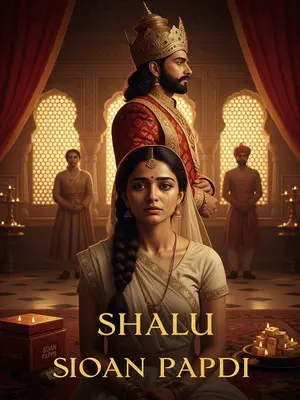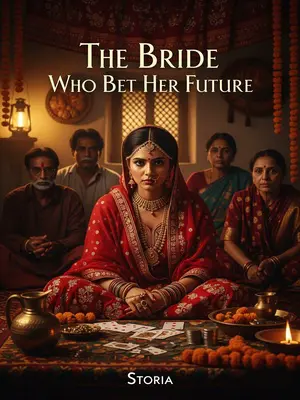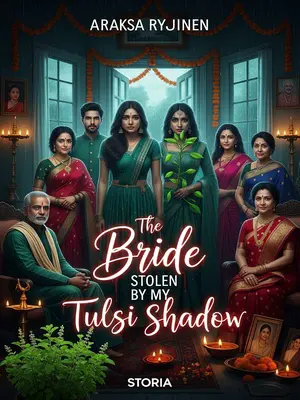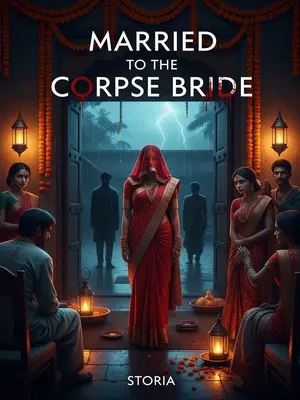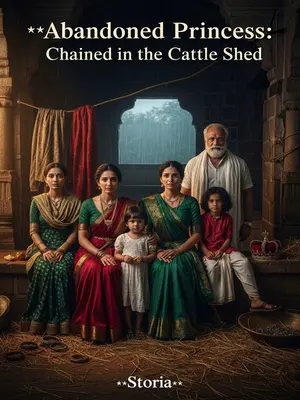Chapter 2: Exile and Echoes
After Ritika left, I hid in my room and cried so hard I could barely breathe.
The small room felt even smaller, the walls closing in on me as I curled up on the thin mattress. I pressed my face into the pillow, trying to muffle my sobs, but the pain wouldn’t go away. The fan overhead creaked, stirring the hot, stale air. Somewhere outside, the pressure cooker hissed, a metallic spoon clattered to the floor in the kitchen, and the faint sound of a temple bell drifted in from the lane—reminding me, even in despair, that life outside carried on.
I had been the MLA’s daughter for eighteen years—never knowing hardship.
The smell of Ma’s sandalwood incense used to drift through the marble corridors, mixing with the distant honk of autos outside our bungalow gate. My life had been filled with laughter, books, and the gentle scoldings of my parents. I never thought it would all vanish in a single night.
But just three months ago, everything changed.
It was just after Holi, the colours barely faded from my palms, when the news came. I still remember the confusion, the sudden arrival of police jeeps at our gate, and the way the neighbours peeped from behind their curtains, whispering and pointing.
My parents disappeared while on inspection in Kaveripur.
No one searched for them. Instead, they accused my family of colluding with the enemy and treason.
The newspapers screamed headlines about betrayal, and the phone stopped ringing. Relatives who once fought to invite us for weddings now pretended not to know us. It was as if our family name had become a curse overnight.
The government order came down, the MLA’s bungalow was sealed, hundreds of people became prisoners.
Our staff, loyal for years, were rounded up and questioned. I saw our driver, old Shambhu kaka, being led away in handcuffs. The garden where I once played hide-and-seek was trampled by boots. It felt like a bad dream I couldn’t wake up from.
I was locked in a pitch-black cell.
The cell was damp, with a single bulb flickering overhead and the smell of stale urine in the corners. I hugged my knees to my chest, shivering in the darkness, wondering if I’d ever see sunlight again.
That’s when Arjun came.
He stood in the doorway, tall and imposing in his uniform, his face shadowed. He shoved a steel dabba into my hands. "Kha lo. Don’t waste food," he muttered, not meeting my eyes. For a moment, I thought I saw something soft in his eyes.
He said my father had saved his life, and to repay the debt, he was willing to marry me.
I didn’t even have time to protest. One day I was in a cell, the next I was in a temple, garlands around my neck, sindoor in my hair. The priest chanted mantras as I stared blankly ahead, my heart numb.
After that, I became the major’s wife.
But he didn’t like me at all.
He was always cold as ice.
The only time we communicated was when he tormented me in bed.
And it was always the same few lines:
"Get on."
"Turn around."
"Raise your waist."
But after all, I am his wife. How could he give me to someone else?
I clenched my fists in distress, but then thought again.
Ritika is Arjun’s confidante—they’ve been through life and death together. What she says must be true.
Thinking of this, I touched my swollen backside from the beatings.
The pain was a dull ache, throbbing with every movement. I remembered his stern face, the way he never looked at me except when issuing orders. Was I really nothing more than a burden to him?
Arjun and I were married properly, by matchmaker and decree. I could endure his torment. But if I had to be with another man… absolutely not.
The thought made my stomach churn. I couldn’t imagine anyone else touching me, not after everything I’d already lost. I wiped my tears with the edge of my dupatta, steeling myself.
I have to leave.
Anyway, I’ve long wanted to go to Kaveripur to find my parents.
I glanced at the battered suitcase under the cot, half-packed for weeks now. Maybe it was time. The memory of my parents’ laughter, my mother’s warm hug, pulled at my heart.
However, when I wiped away my tears and packed my bundle to leave, suddenly glowing words scrolled across my vision, as if someone had hacked into my mind.
[Bhai, the hero must have read too many filmi magazines—real romance is not about gymnastics, yaar!]
[Who told him to listen to bad friends, saying if you want a woman’s heart, you have to show her your prowess.]
[No skill, all effort—the hero in bed is like a blindfolded bullock ploughing the field. If you don’t rein it in, can’t you see the heroine is being tormented to death?]
[Sigh, it’s because neither of them can communicate. Why does the heroine keep suffering? If she just called him 'husband', he’d pluck the moon from the sky for her.]
Staring at the lines of text, I thought: it’s over.
I rubbed my eyes, wondering if I was running a fever. Maybe the stress was making me hallucinate, like those filmi heroines who see omens everywhere. Amma used to say, "Beta, don’t read too many novels, your mind will start playing tricks on you." Maybe she was right.
After being tormented until dawn last night, I must be hallucinating from lack of sleep.
My body felt like lead, every muscle sore. The thin mattress did little to cushion the pain, and the morning sunlight streaming through the window only made my headache worse. I pressed my palms to my temples, willing the voices to stop.
But just as I stepped out the door, the text kept updating.
[The heroine isn’t really going to leave, is she? If you go, you’ll fall into the supporting female’s trap, run into dacoits, be humiliated for three days and nights, and learn what real torment is.]
[Sigh, why do female stories always force this kind of drama? Who’s reading this abuse? I’ll drop it for now and come back when the misunderstandings are cleared up.]
[Don’t trust Ritika, she’s just a two-faced green tea—the hero treasures you more than enough.]
[Exactly! Those two soldiers who harassed you last time? Their graves already have two meters of grass. How could he bear to let other men touch you?]
This suddenly reminded me of when I first arrived at the northern border camp.
The first winter wind had just begun to bite, and I was shivering in my thin shawl. The camp smelled of diesel and smoke, and the men’s voices carried easily through the chilly air.
I overheard two young soldiers talking about me:
"Did you hear? The woman the major brought back was ransomed from jail—she’s the MLA’s daughter."
Their laughter was crude, echoing across the mess tent. I hugged my arms to my chest, feeling exposed and out of place among all these men in olive-green.
"If I’d known a lakh rupees could get such a beauty, we brothers could pool together, each take a day. Just thinking about it is thrilling."
Listening to them scheme about how I’d serve them under their bodies, I shook with rage.
My face burned with shame and anger. I wanted to shout at them, to tell them I wasn’t some object to be passed around, but the words stuck in my throat. I clenched my fists, nails digging into my palms, and turned away, blinking back tears.
But then I saw Arjun invite those two into his tent for chai.
Army men have sharp ears—I don’t believe he didn’t hear.
I could only sigh: brothers are like arms, women like bangles.
A saying Amma used to repeat, reminding me that men always stood together, no matter what. I felt more alone than ever, convinced that Arjun would always choose his comrades over me.
But now, seeing the meaning in the barrage, at that time Arjun invited those two in to deal with them—fatally.
A chill ran down my spine as I realized the truth behind the whispers. Maybe Arjun wasn’t as indifferent as he seemed. Maybe he’d done more to protect me than I knew.
[Eh, why isn’t the heroine leaving? If not, go find the hero.]
[Don’t be afraid of him. If you tell him to go east, he wouldn’t dare go west. If you call him 'husband', he’d give you his life.]
Seeing this, I was a little tempted.
I already knew he was going to lead troops to Kaveripur at the end of the month.
I wanted to go find my parents with him, but didn’t dare speak up.
Maybe I should try?
